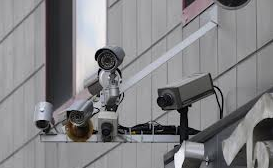
Detroit police and city officials are drafting an ordinance that would make it mandatory for all venues that serve customers after 10 p.m. to join Project Green Light, a program that allows officers to monitor businesses? high-definition video feeds in real time.
All businesses open that late —from party stores and gas stations to sports stadiums like Comerica Park and venues like the Fox Theatre— would be subject to the ordinance if it?s passed, police said.
Police report double-digit reductions in violent crime at businesses that have enrolled in Project Green Light, and they hope the ordinance will result in similar drops in crime citywide. Others insist it would be government overreach to force businesses to join the program, raising privacy concerns and questioning whether such a broad ordinance would be legal.
Detroit City Councilman Andre Spivey, who is spearheading the proposal, said he hopes to have the ordinance ready for a council vote within three months.
?We?ve been meeting with DPD about the draft ordinance,? Spivey said. ?We?re still tweaking it. We?ll hopefully put it to a vote in September, and then phase it in by ZIP code or council district, rather than making it citywide all at once.?
Companies sign up for the Project Green Light program that install video cameras where the live footage is sent to the Detroit Police Real-Time Crime Center, with officers and civilian employees monitor the activity. Businesses in the program also agree to keep their properties well-lit. Officers perform extra patrols at the city?s 123 Project Green Light locations.
?We?ve set the bar nationally with Project Green Light, because it works,? Detroit police spokesman Michael Woody said.
Justin Winslow, president of the Michigan Restaurant Association, agrees the program has been effective – but he said he has a problem with his members being forced to participate.
?Our impression is that Green Light has been a smashing success,? Winslow said. ?We?ve heard positive reports from our members, and we would support initiatives to encourage our members to join. But we always get a bit of pause when there?s a mandate. That?s not something we?d likely support.?
University of Detroit-Mercy law professor Larry Dubin said the ordinance could face challenges in court.
?The validity of the proper use of power exercised by the city in passing an ordinance is whether it serves the health, safety and welfare interests of the community,? Dubin said.
?This ordinance would raise certain issues if challenged,? he said. ?Are there alternative ways to accomplish its goals? Do other cities have this type of ordinance, and if so, (what are) their results? What are the unintended consequences of having this law? These types of issues could raise doubt as to whether this law would be a proper exercise of power.?
Other communities make it mandatory for certain businesses to install video cameras, including Clinton Township, which enacted its ordinance in March that covers gas stations, liquor stores, hotels, banks, pharmacies and other businesses with frequent calls to police.
Detroit in 2014 enacted the Gas Station Ordinance, which required gas stations to install video cameras. Spivey, who introduced that proposal, said his most recent proposal would override that statute.
John Roach, spokesman for Detroit Mayor Mike Duggan, did not respond to multiple requests for comment.
During the first few months after Project Green Light?s launch on Jan. 1, 2016, police reported a 40 percent reduction in violent crime at participating businesses. That has subsequently dropped to 10 percent since the program started, although Woody said the decrease is the result of more companies signing up and skewing the statistics, not a reflection on the program?s effectiveness.
?Let?s say a gas station signs up for the program that?s had a rough year in crime,? he said. ?If we started at a 40 percent reduction from last year at all Green Light locations, and we take on a new facility that?s had a lot of crime since last year, it will affect the overall number.
?The fact is, Green Light businesses have seen double-digit decreases (in violent crime),? Woody said.
The program can cost as little as $1,000 down and $160 a month to lease the equipment, although Woody said prices will vary, depending on the size of the business. The original cost was $5,000 down, in addition to monthly lease charges, but Woody said the city worked with Comcast and DTE Energy to allow businesses to make the remaining $4,000 of the down payment in installments, rather than having to pay it all at once.
Read the complete story at the link below:
Source: detroitnews.com
